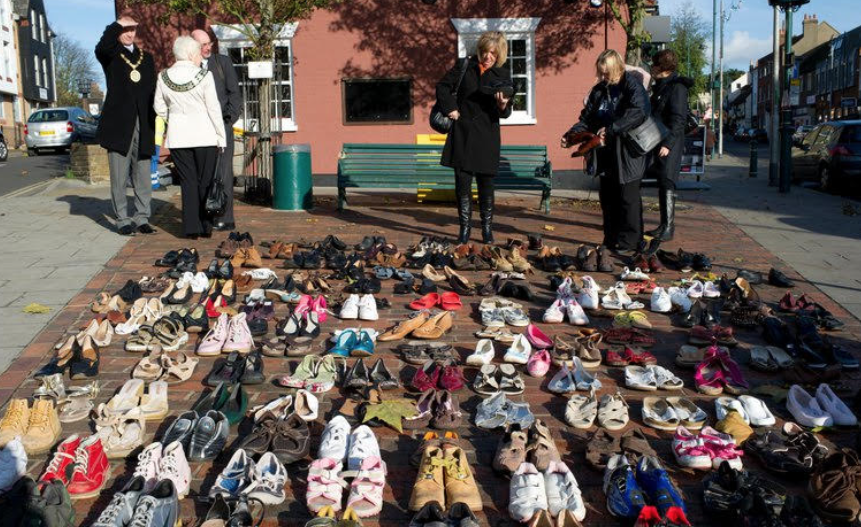Experts say surging costs may offer perpetrators an excuse to control the household’s finances – depriving survivors of the means to escape.
170 pairs of shoes are laid out to represent the number of people killed due to domestic violence in the UK every year
Before she broke up with her partner, Rachel* had savings and a great job. But when her ex refused to pay any child maintenance, she was forced to spend all of her money on lawyers – fighting three costly court cases in less than four years.
Now, Rachel is financially reliant on her father – a pensioner – while her ex, she says, “has the time and the money to use the law to try and punish me further”.
“His family helped him try and hide his money with a whole host of tactics, including adding extra staff on to the pay roll of his business, four months before the final court hearing.”
Meanwhile, Rachel adds, “because he has money, they splash the cash when my child is in their care”.
Rachel is among the one in every six women in the UK who has experienced financial abuse by a current or former partner. Domestic abuse experts fear financial hardship in the coming months will lead to a spike in cases – leaving many unable to escape their abusers.
Ellie Butt, head of policy and public affairs at Refuge, explains: “The cost of living crisis is not going to make people more abusive. Financial stress does not cause domestic abuse. It’s about giving perpetrators the opportunity to exert control.
“Scarcity and price rises will give perpetrators the excuse for abuse and will reduce survivors’ options and perceptions of their options if they were to leave.”
Women need money in our hands in order to to flee violent men.
Sophie Francis-Cansfield, a policy and public affairs manager at Women’s Aid, agrees, saying the crisis could be “catastrophic for survivors and their children, leaving them vulnerable to abuse and potentially trapping them with their abuser”.
“Economic abuse is a common factor within domestic abuse,” she says, citing a 2019 Women’s Aid report, in which almost a third of surveyed domestic abuse survivors reported their access to money being restricted.
“Perpetrators will very much control the finances of their partner to restrict the independence of the women, and ultimately stop them from fleeing,” Francis-Cansfield adds.
Nicola Mann from Women Against Rape says mothers fleeing male-perpetrated domestic abuse face an additional barrier. They risk losing their children because fathers tend to have more money and better resources to fight for custody.
“Social services often cite domestic abuse as a reason, or ‘neglect’, but a mother’s poverty shouldn’t be misconstrued as neglect,” she says. “With the soaring cost of living, this will happen even more.
“Asylum seekers, women with disabilities, single mothers, women of colour, and sex workers, have the least power in society and are going to be most affected by this crisis – and their children have [the] least power of all.”
Mann adds: “Above all, women need money in our hands in order to flee violent men.”
‘Our poverty was orchestrated’
Ryan Hart has experienced the devastating consequences of financial abuse.
“One of the main methods of control my father used to control what we could and couldn’t do was financial control – to keep my mum poor, essentially so she couldn’t survive away from him,” he said, speaking on a panel at the International Journalism Festival in Perugia last month.
Ryan’s mother wasn’t allowed to work full-time or take promotions, her wages went into the joint account, and his father gave her only small amounts of money to buy the bare minimum for herself and their children.
“In winter, my father made sure we were all with him by only heating one room in the house because he claimed that we couldn't afford to heat more than one room, so if we wanted to be warm, we had to be in the room with him so he could watch what we were doing.”
Open Democracy, Nandini Archer, 10 May 2022.

Photo credit: Allsorts Stock Photo / Alamy Stock Photo